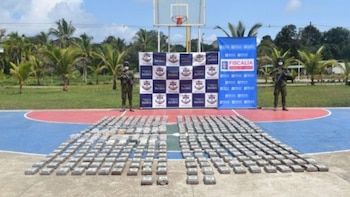
The Colombian Navy announced that it developed a joint operation with the Air Force and the United States Southern Command, which aimed to seize nearly 3.4 tons of cocaine hydrochloride, which were transported to Central America on a “Go Fast” type vessel.
“This important result was achieved thanks to a complete synergy between aircraft of the Colombian Navy and the Colombian Air Force, supported by an air platform of the United States Southern Command; who managed to identify and follow in detail a suspicious motor ship, which was sailing in the Caribbean Sea,” said the communication from the military institution.
He also assured that during the execution of the operation and once the vessel was located, the pursuit of the vessel for several miles with naval means began. This is how a rapid reaction unit of the San Andrés Coast Guard Station succeeded in banning the motorship 121 nautical miles off the coast of the Archipelago.
“The boat, which was manned by five subjects, three of Nicaraguan nationality and two Costa Rican, was immobilized and taken to the dock of the San Andrés Coast Guard Station. When checking the inside of the vessel, the crew of the naval institution found 3,287 rectangular packages inside 132 packages,” the Navy said.
You may be interested: The photos of a drug trafficker captured in Cartagena that the Maduro regime uses to mud Guaidó
Following the events mentioned above, in coordination with members of the Technical Investigation Corps (CTI) of the Attorney General's Office, a Preliminary Approved Identification Test (PIPH) was carried out, which tested positive for cocaine hydrochloride weighing 3,382 kilograms.
It should be said that as much as the alkaloid, the five captured subjects and the immobilized vessel were placed at the disposal of officials of the Prosecutor's Office, an investigative body that will be responsible for carrying out the respective criminal and legal proceedings.
The military authority also announced that in the course of a naval military area registration and control operation in the municipality of Bajo Baudó, Chocó, nearly half a ton of cocaine hydrochloride belonging to the Gulf Clan Organized Armed Group was seized.
The events occurred when Marine Corps units attached to the Pacific Naval Force carried out control, surveillance and area security patrols, detecting a suspicious, unnamed vessel stranded on a beach approximately 5 nautical miles from the municipality of Playa Nueva, north of the municipality of Bajo Baudo.
“Upon arrival at the site, the troops inspected the motor ship, finding inside it 438 rectangular packages, which, when subjected to the Approved Preliminary Identification Tests by officials of the Technical Investigation Corps of the Office of the Prosecutor General of the Nation, returned positive for a total of 438 kilograms of cocaine hydrochloride. During the operation there were no catches, the material was made available to the competent authorities,” said the National Navy.
The seized cargo exceeds 14 million dollars in the international illegal market, “money that failed to enter the coffers of the Gulf Clan Organized Armed Group, strongly affecting its criminal capacity,” the Navy said.
KEEP READING:
Últimas Noticias
Debanhi Escobar: they secured the motel where she was found lifeless in a cistern
Members of the Specialized Prosecutor's Office in Nuevo León secured the Nueva Castilla Motel as part of the investigations into the case

The oldest person in the world died at the age of 119
Kane Tanaka lived in Japan. She was born six months earlier than George Orwell, the same year that the Wright brothers first flew, and Marie Curie became the first woman to win a Nobel Prize

Macabre find in CDMX: they left a body bagged and tied in a taxi
The body was left in the back seats of the car. It was covered with black bags and tied with industrial tape
The eagles of America will face Manchester City in a duel of legends. Here are the details
The top Mexican football champion will play a match with Pep Guardiola's squad in the Lone Star Cup

Why is it good to bring dogs out to know the world when they are puppies
A so-called protection against the spread of diseases threatens the integral development of dogs




